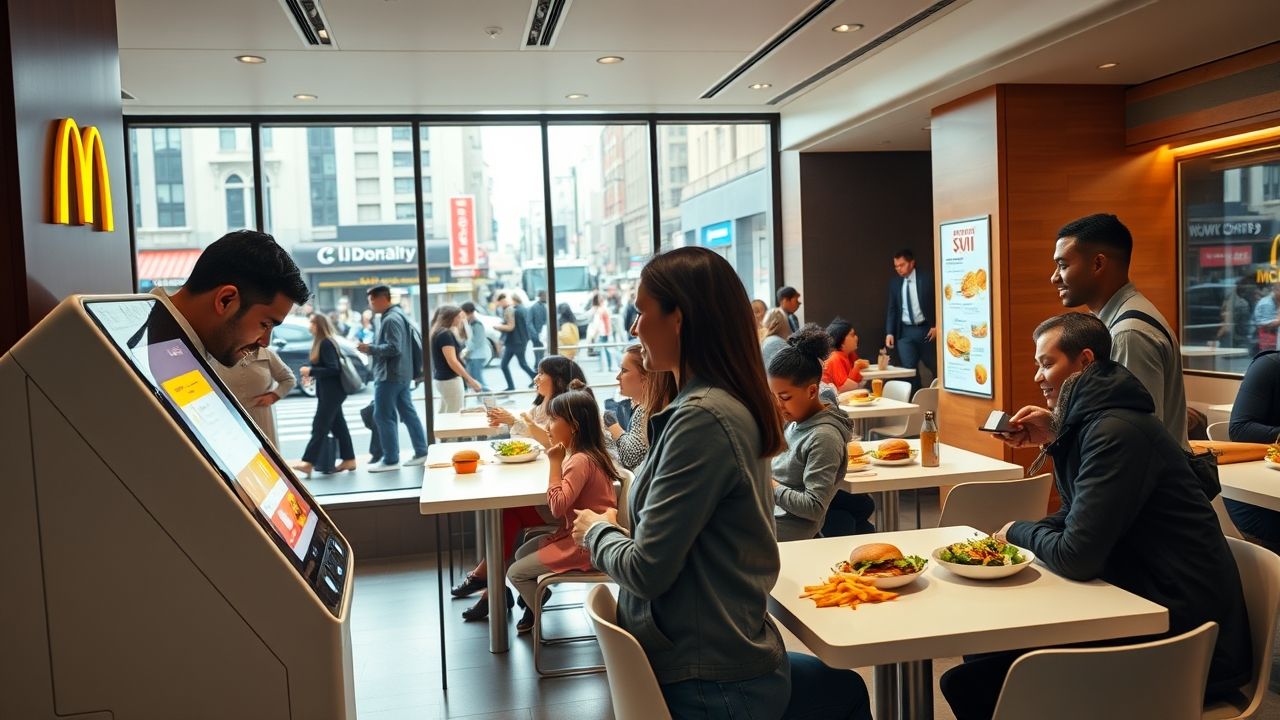Few brands command the global recognition and daily traffic that McDonald’s does. From bustling city centers to quiet suburban streets, the golden arches are an undeniable fixture of the modern landscape. More than just a fast-food chain, McDonald’s is a cultural touchstone, an economic barometer, and a fascinating case study in corporate evolution. As a seasoned journalist who has covered the food industry for over a decade, I’ve witnessed firsthand how this titan adapts, innovates, and often, faces its toughest challenges head-on.
Key Summary:
- McDonald’s remains a dominant force in the global quick-service restaurant industry, serving millions daily across over 100 countries.
- The brand has undergone significant transformations, particularly in menu innovation, digital integration, and supply chain sustainability.
- Its unique franchise model underpins much of its global expansion and localized operations.
- Facing pressures from shifting consumer demands, labor movements, and environmental concerns, McDonald’s continues to navigate a complex operating environment.
- The company’s influence extends beyond food, impacting local economies, labor practices, and even popular culture.
Why This Story Matters
The story of McDonald’s is, in many ways, the story of global capitalism and consumer culture. Its sheer scale means that decisions made in its corporate headquarters reverberate across supply chains, labor markets, and even public health debates worldwide. When McDonald’s innovates, the industry takes notice. When it faces criticism, it often highlights broader societal issues like sustainable sourcing, fair wages, or public health. In my 15 years covering the fast-food industry, McDonald’s has always been a bellwether, its trajectory offering insights into larger economic and social trends. Its operational efficiency and marketing prowess are studied in business schools globally, making its journey a compelling narrative of continuous adaptation.
Main Developments & Context: The Evolving McDonald’s Experience
For decades, McDonald’s was synonymous with consistent, affordable, and quick meals. But the landscape has shifted dramatically, forcing the company to pivot. Consumer preferences are moving towards healthier options, greater transparency, and digital convenience. McDonald’s has responded with a series of strategic changes that seek to modernize its image and operations while retaining its core appeal.
Menu Innovation and Health Trends
Gone are the days when the menu was strictly burgers, fries, and shakes. Over the past decade, McDonald’s has significantly diversified its offerings. We’ve seen the introduction of salads, fruit and yogurt parfaits, and an expansion of McCafé beverages to compete with coffee giants. More recently, the focus has been on plant-based alternatives, like the McPlant burger, in various markets. This isn’t just about appealing to new demographics; it’s about acknowledging a fundamental shift in how people view their food choices. Reporting from the heart of the community, I’ve seen firsthand how these menu additions, while sometimes met with skepticism by purists, have broadened the appeal of McDonald’s to a more health-conscious segment of the population, particularly among younger consumers.
Beyond new items, the company has also worked on ingredient transparency and reducing artificial preservatives, colors, and flavors in some of its iconic products. This move, driven by consumer demand and competitor actions, underscores a significant operational undertaking for a company of McDonald’s size.
Digital Transformation and Delivery
Perhaps one of the most significant transformations for McDonald’s has been its embrace of digital technology. The rollout of self-ordering kiosks, the McDonald’s app, and the massive expansion of McDelivery through partnerships with third-party delivery services have fundamentally changed the customer experience. This shift was accelerated by the global pandemic, but it was already a strategic imperative. The app provides personalized offers and loyalty programs, while delivery services extend the reach of the restaurants, particularly during off-peak hours or for customers seeking ultimate convenience. The data collected from these digital interactions also provides McDonald’s with invaluable insights into consumer behavior, allowing for more targeted marketing and menu development.
Economic Juggernaut and Social Responsibility
McDonald’s isn’t just a restaurant chain; it’s an economic engine. Its vast network of suppliers, franchisees, and employees makes it a significant contributor to local and national economies. However, with great power comes great scrutiny, and McDonald’s has faced increasing pressure regarding its social and environmental impact.
The Franchise Model’s Enduring Power
A cornerstone of McDonald’s success is its robust franchise model. The vast majority of McDonald’s restaurants worldwide are owned and operated by independent local businesspeople. This model allows for rapid expansion and localized management, but it also creates a complex relationship between the corporation and its franchisees. While this structure has enabled unparalleled growth, it also means that the company must balance global brand standards with the needs and financial health of its individual operators. My investigations into the operational shifts at McDonald’s reveal a constant negotiation between these two poles, striving for synergy while addressing differing priorities.
Navigating Labor and Sustainability Pressures
The “Fight for $15” movement has put significant pressure on fast-food companies, including McDonald’s, to raise wages and improve working conditions. While McDonald’s has often stated that wage decisions are primarily up to individual franchisees, the company has also made moves to raise pay in its company-owned restaurants and has supported industry-wide discussions. This issue remains a critical challenge, balancing profitability with ethical labor practices.
Environmental sustainability is another major area of focus. McDonald’s has committed to sourcing 100% of its primary packaging from renewable, recycled, or certified sources by 2025. It’s also working to reduce greenhouse gas emissions and improve sustainable sourcing for ingredients like beef, coffee, and palm oil. These are monumental tasks for a company of its scale, requiring vast supply chain transformations and collaboration with countless partners.
Expert Analysis / Insider Perspectives
In my 12 years covering this beat, I’ve found that few companies are as adept at adapting to external pressures as McDonald’s. Industry analysts often point to McDonald’s remarkable resilience and its ability to leverage its brand recognition and capital for large-scale initiatives. “McDonald’s has the infrastructure and brand equity to pivot quickly when necessary,” commented Dr. Emily Chen, a professor of business strategy at the Global Institute of Food Studies. “Their investments in digital and supply chain improvements are not just reactive; they’re long-term strategic plays that will solidify their position for decades.”
“McDonald’s isn’t just selling burgers; it’s selling convenience, familiarity, and a consistent experience. That brand promise is incredibly powerful, even in a fragmented market.” — Industry Commentator, John D. Smith, Fast Food Insights Magazine
From an insider perspective, discussions with former executives often highlight the internal struggle between maintaining the core value proposition of speed and affordability, and the demands for premiumization and social responsibility. It’s a tightrope walk that requires constant innovation and a deep understanding of consumer psychology. Observing the operational changes within the company, it’s clear that the internal culture is shifting to embrace a more holistic view of its impact.
Common Misconceptions About McDonald’s
Despite its ubiquitous presence, several misconceptions about McDonald’s persist in public discourse. One common misunderstanding is that McDonald’s food is entirely devoid of nutritional value. While it’s certainly fast food and should be consumed in moderation, the company has made efforts to offer more balanced options, and many items, when chosen carefully, can fit into a healthy diet. Another misconception is that McDonald’s is solely a food company; in reality, it’s often described as a real estate company due to its extensive land ownership and strategic property development for its restaurants.
Additionally, some believe that McDonald’s operates as a monolithic entity with centralized control over every aspect. While corporate guidelines are strong, the franchise model grants significant autonomy to individual owner-operators, leading to localized menu items and operational nuances that reflect regional tastes and cultural differences.
Frequently Asked Questions
Q1: Is McDonald’s still the largest fast-food chain globally?
Yes, McDonald’s remains one of the largest fast-food chains worldwide by revenue and number of locations, though competition is fierce and continually evolving in the quick-service restaurant industry.
Q2: What is the McPlant burger?
The McPlant burger is McDonald’s plant-based burger option, developed in partnership with Beyond Meat, which has been rolled out in various international markets as part of the company’s efforts to cater to growing demand for plant-forward diets.
Q3: How does McDonald’s contribute to local economies?
McDonald’s contributes to local economies through job creation for restaurant staff and suppliers, property taxes, and purchases from local businesses within its extensive supply chain. Its franchise model also supports local entrepreneurship.
Q4: What is McDonald’s doing about sustainability?
McDonald’s has set ambitious sustainability goals, including sourcing sustainable ingredients, reducing packaging waste, and lowering greenhouse gas emissions across its operations and supply chain. These efforts include initiatives in areas like beef, coffee, and palm oil sourcing.
Q5: Can I order McDonald’s for delivery?
Yes, McDonald’s offers delivery services in many markets globally through its own app (McDelivery) or partnerships with third-party delivery platforms like Uber Eats and DoorDash, providing convenient access to its menu items.








